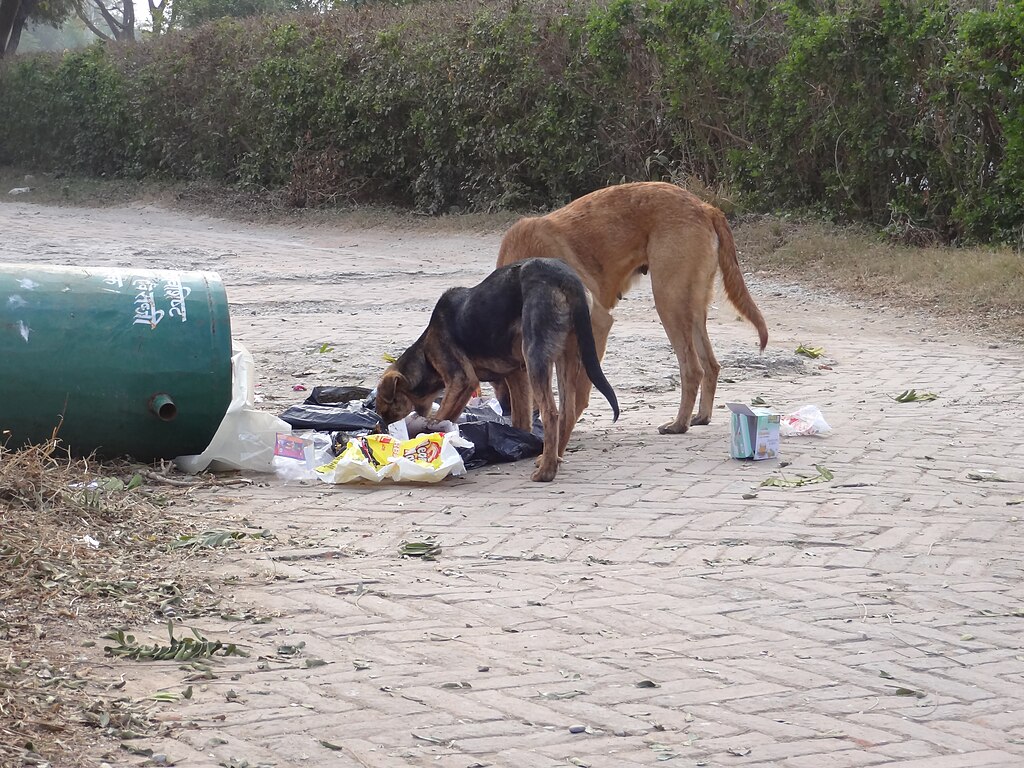Making of a Poem: Kim Hyesoon and Cindy Juyoung Ok on “Person Walking Backward”

Achat1999, CC BY-SA 4.0, via Wikimedia Commons.
For our series Making of a Poem, we’re asking poets and translators to dissect the poems they’ve published in our pages. Kim Hyesoon’s poem “Person Walking Backward,” translated by Cindy Juyoung Ok, appears in our new Summer issue, no. 248. Here, we asked Kim and Ok to reflect on their work.
1. Kim Hyesoon
How did this poem start for you? Was it with an image, an idea, a phrase, or something else?
This poem began during an interview. The poet who came to interview me asked, “What do you think about Korean poetry these days?” I answered, “I think Korean poetry these days is like a dog running on the highway.” There is a dog inside my poem. This dog living in “Person Walking Backward” is eternally digging through the “pile of garbage” of the present. The poem is a poem about time, two types of time. Continuous time and frozen time. The dog’s time and my life’s time. The poem’s time and my time. Dying’s time and living’s time. Each is the possibility of being to one another.
How did writing the first draft feel to you? Did it come easily, or was it difficult to write? Are there hard and easy poems?
At the time of this poem’s writing in the early eighties, South Korea was under the rule of a dictator. They elected the president among themselves in the gymnasium [translator’s note: “gym elections” refer to a farcical official process of internal selection that supported two authoritarian regimes]. I felt like every day was a day when the sun did not rise. In that period, I would write poems without editing them. I simply called the screams that burst out of me poetry. In our country, literary magazines and newspapers ask poets to write poems, rather than poets submitting poems without being commissioned—only writers hoping to make literary debuts submit their work themselves. During this time, I wrote poems only upon request. I didn’t write anything else. I sealed the bottle caps of the poems that were springing out of me because I was despairing over the helplessness of poetry. But in gradually freeing my mind from the dictatorship, I began to write and even revise poems on my own again. I don’t know if there can be a distinction between difficult and easy poems. Maybe there can be poems written without pain.
How did you come up with the title for this poem?
When I was writing this poem, I thought of this earth we live on as “the hell of that star,” and I still do. If this earth is not a prison or hell buried under countless stars, how is it that humans can hurt, kill, and consume other humans? How is it that humans long for others, ache, and suffer? How is it that one can sit in one’s room and watch dictatorships and wars with peace of heart? The poems I wrote around this time had titles that were all about walking backward, looking at the world upside down, reversing meanings.
When did you know this poem was finished? Were you right about that? Is it finished, after all?
Can you use the word finished about a poem? There is no “finish” for a poem. A poem is open and unfinished to the last line. I put a poem that is not finished in a poetry collection. Then, in another poem, in a different book of poems, I start writing again toward the “finish” of the earlier poem. Because the poem is never finished, it just opens the door and goes out.
2. Cindy Juyoung Ok
How would you describe the translation process?
I used to be asked to help manage plays and, as a favor to friends, I would control the light board or make the rehearsal schedules while observing, over time, the dynamics of the production. I found it profound how there were always several true centers: the show belonged to so many, without contradiction. A translator also works with the writer: not in a fifty-fifty or ten-ninety model but, like the playwright and the actor, or the director and the choreographer, in a relationship of one hundred–one hundred. When a scene had gone well or poorly, there was never just one reason, never one person to fault or credit. Writing and translating are similarly corresponding, raveled processes.
Did you show your drafts to other writers or friends or confidants? If so, what did they say?
I showed drafts of this translation to two people. My minute questions were whether “here and there” or “this way and that” better fit the poem’s world, and the sonic effects of “footprints left in the sand” versus “footprints in the sand.” I also discussed the poem’s structure with the Review’s poetry editor. It was lucky—and unfortunately unusual—to be able to exchange thousands of words about where to hold and release x.
What was the challenge of this particular translation?
This poem is imaginative, but nothing about it is a joke. So the serious stakes could not be overcast by associations of the dog with fable or satire.
Do you regret any revisions?
My revisions were willful efforts to minimize future regret so luckily, no. I also understand my translation as a contribution to the poem’s life, not some definitive resolution—a beginning, an invitation, not a termination.
Kim Hyesoon is the author of fourteen poetry collections. The Hell of that Star will be published by Wesleyan University Press in 2026.
Cindy Juyoung Ok is a translator and the author of the poetry collection Ward Toward.
Copyright
© The Paris Review
